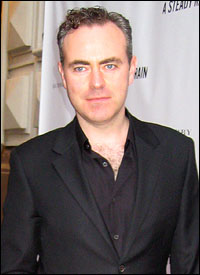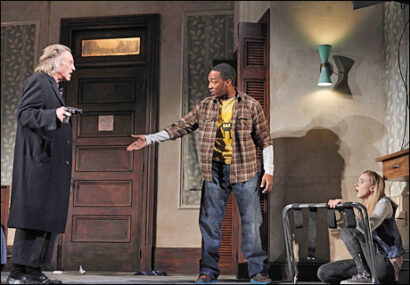
*
Act I: 1995. Up-and-coming director John Crowley is asked to read a script for a development workshop in London at the National Theatre's Studio. The young writer, Martin McDonagh, has not yet been produced anywhere. "I couldn't believe it when I read it," Crowley says about McDonagh's The Lieutenant of Inishmore. "It was mind-blowing."
But Crowley is committed to directing a play in Ireland, and after one phone conversation with McDonagh, they go their separate ways.
Act II: 2003. McDonagh is now a theatrical star with two Tony nominations to his name and a new work, The Pillowman, ready to go. He sees a film, "Intermission," directed by Crowley, and is struck by their shared darkly comic sensibility. Inspired, McDonagh asks Crowley to helm Pillowman, and the show earns an Olivier Award for Best New Play in London and a Tony nomination on Broadway.
Act III: 2010. If this were a McDonagh play, we'd now be splattered with blood and gore. But this story has a peaceful, happy ending: Crowley and McDonagh discover they are so simpatico they decide to team up again for A Behanding in Spokane, now at the Gerald Schoenfeld Theatre, starring Christopher Walken, Sam Rockwell, Anthony Mackie and Zoe Kazan. "It was pretty instant with us," Crowley says over dinner with McDonagh at the Broadway hangout Angus McIndoe. "The two of us are quite well-suited temperamentally. We have a very strong dialogue."
"We're always on the same page humor-wise, and John's a lot smarter than I am," McDonagh adds. "He uses all these big words so I have to keep a dictionary under the table."
Behanding is about a man looking for his missing left hand who instead finds a con-artist couple. They end up chained to a radiator; hilarity and violence ensue. It's McDonagh's first play set in America instead of Ireland, and his first to premiere on Broadway. "It was just an American story in my head from the beginning," says McDonagh, who turns 40 in March. (Crowley is a year older.) Staging it here promised a better crop of American actors, and the play's scope felt more Broadway than Off-Broadway, he says. "There's something really fun in the gamble, too. And it's not our money."
Behanding follows McDonagh's feature film debut, "In Bruges," which he wrote and directed. It earned him a Best Screenplay Oscar nomination, which followed his Oscar win for Best Live Action Short for "Six Shooter." McDonagh says editing a film made him a better playwright. "I can hack bits out more easily. It's about getting to the heart of the matter quickly. I finished Behanding, then cut 15 pages out."
McDonagh is unusual in his disdain for the workshop approach — he doesn't hand over a script until it's polished and honed; then, for the most part, he's done with it. Crowley clearly gets it. "With Martin's plays, there is one way of doing them that's better than any other," the director says. "It's not an open-ended dialogue about the numerous ways of doing things.
"If something is not working in it, I don't think it's my job to cut it. My job is to figure out how to make it work...though it's bloody hard sometimes."
And McDonagh does rely a great deal on Crowley. "There's lots about it that has to be solved and I had no solution in the writing," McDonagh says. "For staging this visually, John and [scenic designer] Scott Pask came up with the answers." (Behanding is simpler visually than Pillowman or Inishmore. "It can be done regionally and in amateur theatre," McDonagh says. "I'm big after the amateur dollar." To which Crowley retorts, "Yes, your next play is going straight there.")
 |
||
| John Crowley |
||
| photo by Aubrey Reuben |
For Behanding, both men have learned about the impact Christopher Walken, the last actor cast, can have on a play. McDonagh didn't adapt the part to accommodate his star — he didn't have to. "Chris changes stuff without my help — but in a good way," he says. "His line readings and choices are sometimes outlandish, but you don't want to corral him."
"He's so distinctive in line readings and he has that funny-scary thing he can do so well," Crowley says. "He's tonally spot on. And he doesn't ever feel studied; he's in the moment."
Crowley says the performance is "astonishing" in that Walken has "colonized" the play a bit without losing any of McDonagh's voice. "But I am going to put back a couple of those pauses and a couple of the question marks," laughs McDonagh, his tone implying that he knows such efforts are futile but that for once he's willing to make an exception.











